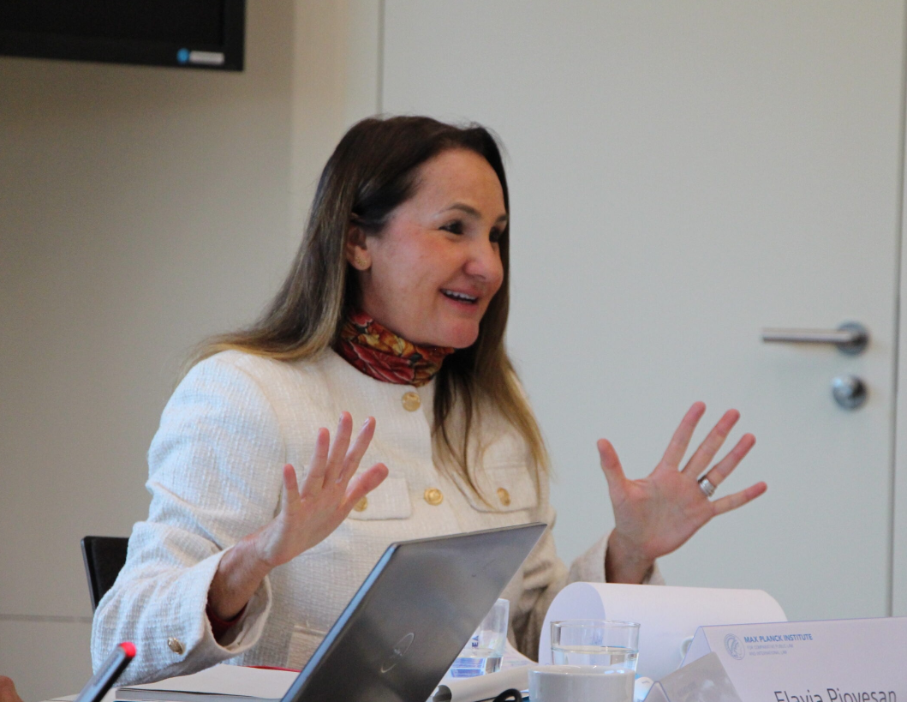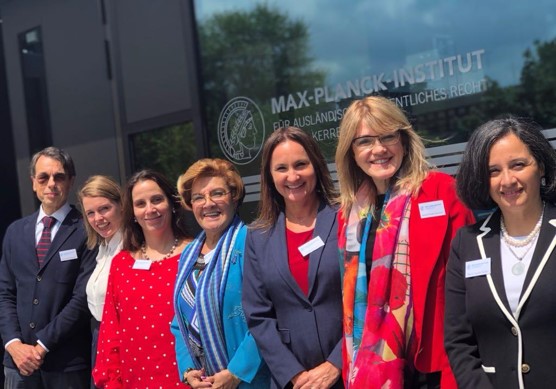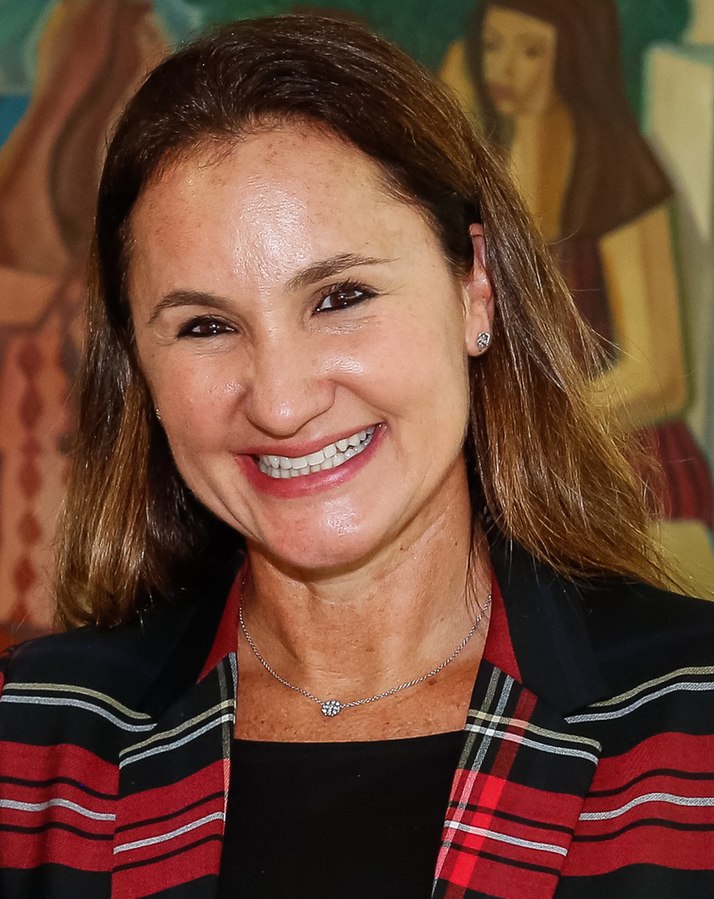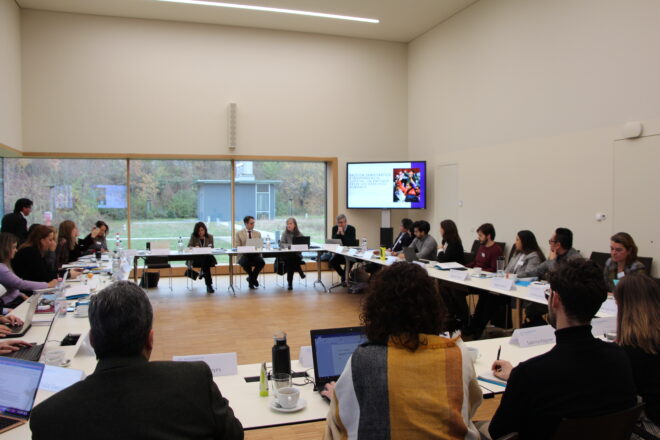English
My academic trajectory can be divided into two phases: before and after the MPIL. During my postdoctoral studies from 2007 to 2008, as a PhD holder and professor at the Pontifícia Universidade Católica de São Paulo (PUC-SP), I had the privilege of being awarded an MPIL Fellowship, which presented me with the opportunity to develop an in-depth comparative analysis of the Inter-American and European regional systems for the protection of human rights. My research encompassed a comprehensive study of the respective institutions, key actors, agendas, landmark precedents, effectiveness, and jurisdictional dialogues, as well as their impact on the protection of human dignity and the prevention of human suffering.
From 2009 to 2014, I was awarded a Humboldt Foundation Georg Foster Research Fellowship, which allowed me to further deepen my comparative research on the European and the Inter-American regional systems. The primary focus here lay on their jurisprudence concerning central human rights themes, such as equality and non-discrimination, protection of social rights, and the fight against terrorism. Additionally, I was able to explore the evolving dialogues between these systems through interactions and mutual impacts, which fostered the Inter-Americanization of the European system and the Europeanization of the Inter-American system, as reflected in the updated and expanded versions of my books Direitos Humanos e Justiça Internacional: estudo comparado dos sistemas regionais interamericano, europeu e africano (Human Rights and International Justice: A comparative study of the European, Inter-American, and African systems) in the 10th edition (2023); Temas de Direitos Humanos (Themes in Human Rights) in the 12th edition (2023); and Direitos Humanos e o Direito Constitucional Internacional (Human Rights and International Constitutional Law) in the 21st edition (2023).
In fruitful collaboration with the MPIL, with a multi-level and comparative approach, and special emphasis on constitutional and regional dialogue, considering the emergence of a new public law and aiming to strengthen human rights and democracy in the South American region, three important anthologies were published in Brazil under the coordination of Professor Armin von Bogdandy, Mariela Morales Antoniazzi, and myself: Human Rights, Democracy and Legal Integration in South America (2010); Human Rights, Democracy, and Legal Integration: Advancing in constitutional and regional dialogue (2011); and Human Rights, Democracy, and Integration: The emergence of a new public law (2013).

The author at the ICCAL Winter Seminar in Heidelberg, 2023[1]
In 2016 and 2017, my collaboration with the MPIL intensified within the framework of the ICCAL (Ius Constitutionale Commune in Latin America) project, fostering a solid academic network. This network’s transformative approach paves the way for transformative regional constitutionalism in the most unequal and violent region of the world and for strengthening the positive impact of the Inter-American System on the values of human rights, democracy, and the rule of law in Latin America. With this perspective and under the coordination of Professor Armin von Bogdandy, Mariela Morales Antoniazzi, and myself, three new anthologies on the Ius Constitutionale Commune in Latin America were published in Brazil: Conceptual Framework – vol. I (2016); Pluralism and Inclusion – vol. II (2016); and Jurisdictional Dialogues and Conventionality Control – vol. III (2016). In 2017, the anthology Transformative Constitutionalism in Latin America, edited by Armin von Bogdandy, Mariela Morales Antoniazzi, Eduardo MacGregor Ferrer, and myself, was published by Oxford University Press, aiming to expand the public debate on ICCAL and involve a wider audience. Continuing our intense collaboration with the MPIL, in 2019, we published the collective work Transformative Constitutionalism, Inclusion, and Social Rights, coordinated once again by Armin von Bogdandy, Mariela Morales Antoniazzi, and myself.
In 2017, I had the immense honour of being elected by the General Assembly of the Organization of American States (OAS) to the Inter-American Commission on Human Rights (IACHR) for a four-year mandate (2018-2021). The main function of the IACHR is to promote respect for and the defence of human rights in the Americas. From 2020 to 2021 I served as Vice-President of the IACHR. In addition to my solid and fruitful academic cooperation with the MPIL as a PhD professor at PUC-SP, my role as a commissioner furthered institutional collaboration between the MPIL and the IACHR during this period. This partnership resulted in three important institutional advances, with essential support from the MPIL:
- the creation of the Impact Observatory of the IACHR, aiming to map and systematize the impacts generated by the IACHR in the Americas, foster synergies with similar initiatives, and promote dialogue and coordination with strategic actors and communities interested in the effectiveness of the Inter-American Human Rights System, in 2021;
- the adoption by the IACHR of the Inter-American Principles on Academic Freedom and University Autonomy, in 2021; and
- the launch of the Specialized Academic Network for Technical Cooperation by the IACHR, involving over 70 universities across the Americas, in 2020.

Flavia Piovesan at the Ibero-American Seminar at the MPIL on the occasion of the 60th anniversary of the Inter-American Commission on 16 July 2019 (Photo: MPIL)
In 2022, I had the great honour to, with deep gratitude, receive the Humboldt Georg Foster Research Award. This prestigious award marked the culmination of my academic journey, which began as a Humboldt Foundation Georg Foster Research Fellow at the MPIL from 2009 to 2014. During a remarkable ceremony in Berlin on June 29, 2023, I was presented with the award certificate, and a laudation was delivered, highlighting the significance of my research:
“(…) in her ongoing research, she focuses on the transformative potential of law. Professor Piovesan is also a founding member of the Ius Constitutionale Commune Network in Latin America (ICCAL). During her stay in Germany, she will focus on the functioning of the Inter-American human rights system (…)”.
In this sense, the anthology The Impact of the Inter-American Human Rights System: Transformations on the Ground has recently been published by Oxford University Press, once again coordinated by Armin von Bogdandy, Mariela Morales Antoniazzi, Eduardo MacGregor Ferrer, and myself. The book is structured into three parts: 1) framing the Impact of the Inter-American System; 2) impact and Inter-American Standards; and 3) optimizing the Impact of the Inter-American System.
Having concluded my mandate at the IACHR (in December 2021), as a professor at PUC-SP since 2022, and now also as the Scientific Coordinator of the Monitoring and Enforcement Unit of decisions of the Inter-American Court at the National Council of Justice in Brazil, with the support of the Humboldt Georg Foster Research Award, the goal is to create an Impact Observatory in Brazil as a pilot project to map and systematize the transformative impact of the Inter-American System on the Brazilian experience, particularly regarding the adoption of structural changes in normative frameworks and public policies. Furthermore, another important goal is to promote the adoption of a protocol concerning national mechanisms for the implementation of international human rights decisions as a regional reference (inspired by a victim-centred approach, fostering inter-institutional and federative dialogue, adopting national implementation plans with specific goals and deadlines, and promoting transparency and accountability).
Additionally, the objective is to continue studying and analysing the transformative impact of the Inter-American system, always in solid and fruitful collaboration with the MPIL through inspiring academic projects, publications, books, and seminars. Notably, the edition of the series of volumes of the Jurisprudence of the Federal Supreme Court of Brazil: Implementing Rights, focusing on human rights themes, has been a significant achievement. These publications encompass volumes dedicated to LGBTI rights (2022), women’s rights (2023), racial equality (2023), and indigenous peoples’ rights (2023), being the result of the institutional cooperation between the National Council of Justice (CNJ), the Supreme Federal Court (STF), and the MPIL. They aim to identify and systematize the emblematic decisions of the STF regarding human rights, highlighting the dialogue with the Inter-American system, the incorporation of Inter-American standards, and the exercise of conventionality control. In 2022, the President of the STF and the CNJ launched the National Pact of the Judiciary for Human Rights, aiming to strengthen the culture of human rights and conventionality control in Brazil’s judiciary through various initiatives, including publications (such as the jurisprudence series), a national contest for human rights with an emphasis on conventionality control and Inter-American jurisprudence, the inclusion of “Human Rights” as a subject in all public judicial entrance exams at all levels of the national judiciary, with a focus on the Inter-American system, jurisprudence of the Inter-American Court, and conventionality control, and the promotion of training programs in human rights and conventionality control for judges across Brazil. All these relevant initiatives of the National Pact of the Judiciary for Human Rights count on the essential institutional support of the MPIL.
Since 2007, over the course of more than 16 years, a solid legacy of scientific cooperation with the MPIL has been cultivated, through academic projects, with the editing of nearly a dozen anthologies, institutional publications, national and international seminars, human rights and conventionality control training courses, and innovative institutional projects in Brazil and the Americas (such as the Impact Observatory of the IACHR, the future Impact Observatory to be created in Brazil, and the future protocol concerning national mechanisms for the implementation of international human rights decisions). The values inspiring these numerous initiatives resulting from scientific cooperation with the MPIL revolve around the triad of human rights, democracy, and the rule of law, with a special focus on the transformative impact of the Inter-American system.
In conclusion, academic sabbaticals in Heidelberg, supported by the MPIL and the Humboldt Foundation Georg Foster Research Fellowship (from 2009 to 2014) and culminating with the Humboldt Georg Foster Research Award (in 2022), have been pivotal in shaping my academic journey.
Finally, I celebrate the extraordinary role of the MPIL in my academic trajectory for three main reasons:
- The MPIL provides a fertile and enriching laboratory of ideas, characterized by scientific excellence, the highest methodological rigor, profound reflection, free and fearless debate, pluralism, and a comparative perspective.
- It nurtures the ICCAL project through a robust academic network, with an emphasis on the transformative mandate of the Inter-American system in the region.
- It contributes to transformative academic and institutional projects aimed at fostering a new legal paradigm centred on the protection of human dignity.
In celebration of the MPIL’s 100th anniversary, I express my deepest appreciation and gratitude to the Institute, especially to its devotion to science, innovative ideas, and the strong belief in the power of ideas to transform realities and drive social change.
[1] Photo: MPIL.
[2] Photo: MPIL.
Português
Minha trajetória acadêmica pode ser dividida em duas fases: antes e depois do MPIL. Durante meu pós-doutorado, de 2007 a 2008, como Professora Doutora titular da Pontifícia Universidade Católica de São Paulo (PUC-SP), tive o privilégio de ser contemplada com uma bolsa do MPIL, o que me deu a oportunidade de desenvolver uma profunda investigação na análise comparativa dos sistemas regionais interamericano e europeu. A investigação abrangeu o estudo das respectivas instituições, atores-chave, agendas, precedentes históricos, eficácia e diálogos jurisdicionais, bem como seus impactos na proteção da dignidade humana e na prevenção do sofrimento humano.
De 2009 a 2014, ao ser contemplada com a bolsa de estudos Georg Foster da Fundação Humboldt, aprofundei a investigação comparativa entre os sistemas regionais europeu e interamericano, centrada na análise da jurisprudência relativa aos temas centrais dos direitos humanos, como a igualdade e a não discriminação, a proteção dos direitos sociais e a luta contra o terrorismo. Além disso, tive a oportunidade de explorar os diálogos crescentes entre estes sistemas, através de interações e impactos mútuos, que promoveram a interamericanização do Sistema Europeu e a europeização do Sistema Interamericano, como refletido nas versões atualizadas e alargadas dos meus livros, Direitos Humanos e Justiça Internacional: Um estudo comparativo dos sistemas europeu, interamericano e africano, em sua 10ª edição (2023); Temas de Direitos Humanos, em sua 12ª edição (2023); e Direitos Humanos e o Direito Constitucional Internacional, em sua 21ª edição (2023).
Em frutífera colaboração com o MPIL, com uma abordagem multinível e comparativa, e especial ênfase no diálogo constitucional e regional, considerando a emergência de um novo direito público e visando o fortalecimento dos direitos humanos e da democracia na região sul-americana, foram publicados no Brasil três importantes antologias sob a coordenação do Professor Armin von Bogdandy, Mariela Morales Antoniazzi e minha: Direitos Humanos, Democracia e Integração Jurídica na América do Sul (2010); Direitos Humanos, Democracia e Integração Jurídica: Avançando no diálogo constitucional e regional (2011); e Direitos Humanos, Democracia e Integração: A emergência de um novo direito público (2013).

The author at the ICCAL Winter Seminar in Heidelberg, 2023[1]
Em 2016 e 2017, minha colaboração com o MPIL intensificou-se no âmbito do Projeto ICCAL (Ius Constitutionale Commune na América Latina), tendo por consequência, a edificação de uma sólida rede académica. A abordagem transformadora dessa rede abre caminho para um constitucionalismo regional transformador na região mais desigual e violenta do mundo, fortalecendo o impacto positivo do Sistema Interamericano sobre os valores dos direitos humanos, da democracia e do Estado de Direito na América Latina. Com essa perspectiva e sob a coordenação dos professores Armin von Bogdandy, Mariela Morales Antoniazzi e minha, foram publicados no Brasil três novas antologias sobre o Ius Constitutionale Commune na América Latina: Marco Conceitual – vol. I (2016); Pluralismo e Inclusão – vol. II (2016); e Diálogos Jurisdicionais e Controle de Convencionalidade – vol. III (2016). Em 2017, foi publicado pela Oxford University Press a antologia Constitucionalismo Transformador na América Latina, com o objetivo de não somente ampliar o debate público sobre o ICCAL, bem como envolver um público mais amplo. Em continuidade à intensa colaboração com o MPIL, em 2019, publicamos a obra coletiva Constitucionalismo Transformador, Inclusão e Direitos Sociais, coordenada mais uma vez por Armin von Bogdandy, Mariela Morales Antoniazzi e por mim.
Destaco que em 2017, tive a imensa honra de ser eleita pela Assembleia Geral da Organização dos Estados Americanos (OEA) para a Comissão Interamericana de Direitos Humanos (CIDH) para um mandato de quatro anos (2018-2021). A principal função da CIDH é promover o respeito e a defesa dos direitos humanos nas Américas. Nesse âmbito, em 2020-2021, desempenhei o cargo de vice-presidente da CIDH. Além da minha sólida e profícua cooperação acadêmica com o MPIL, como professora doutora da PUC-SP, minha atuação como comissionada aprofundou a colaboração institucional entre o MPIL e a CIDH durante esse período. Essa parceria resultou em três importantes avanços institucionais, com apoio fundamental do MPIL:
- a criação do Observatório de Impacto da CIDH, com o objetivo de mapear e sistematizar os impactos gerados pela CIDH nas Américas, fomentar sinergias com iniciativas similares e promover o diálogo e a articulação com atores estratégicos e comunidades interessadas na efetividade do Sistema Interamericano de Direitos Humanos em 2021;
- a adoção pela CIDH dos Princípios Interamericanos sobre Liberdade Acadêmica e Autonomia Universitária em 2021; e
- o lançamento da Rede Acadêmica Especializada em Cooperação Técnica pela CIDH, envolvendo mais de 70 universidades nas Américas em 2020.

Flavia Piovesan at the Ibero-American Seminar at the MPIL on the occasion of the 60th anniversary of the Inter-American Commission on 16 July 2019 (Photo: MPIL)
Como resultado, em 2022, tive a honra e a profunda gratidão de receber o Prémio de Investigação Humboldt Georg Foster. Este prestigiado prémio marcou o culminar do meu percurso académico, que começou como investigadora contemplada pela Bolsa Georg Foster da Fundação Humboldt no MPIL de 2009 a 2014. Durante uma cerimónia notável em Berlim, em 29 de junho de 2023, recebi o certificado do prémio e foi laureada, pela importância da minha investigação: “(…) sua investigação, centra-se no potencial transformador do direito. A Professora Piovesan é também membro fundador da Rede Ius Constitutionale Commune na América Latina (ICCAL). Durante a sua estadia na Alemanha, focalizou-se no funcionamento do Sistema Interamericano de Direitos humanos (…)”.
Neste sentido, a antologia O impacto do Sistema Interamericano de Direitos Humanos: Transformações em curso está atualmente em processo de edição pela Oxford University Press, mais uma vez coordenado por Armin von Bogdandy, Mariela Morales Antoniazzi, Eduardo MacGregor Ferrer e por mim. O livro está estruturado em três partes: 1) enquadramento do impacto do Sistema Interamericano; 2) impacto e normas interamericanas; e 3) otimização do impacto do Sistema Interamericano.
Concluído meu mandato na CIDH (em dezembro de 2021), como professora da PUC-SP desde 2022, e agora como Coordenadora Científico da Unidade de Monitoramento e Cumprimento de decisões da Corte Interamericana, no Conselho Nacional de Justiça no Brasil, com o apoio do Prêmio Humboldt Georg Foster de Pesquisa, tenho por objetivo criar um Observatório de Impacto no Brasil como um projeto piloto para mapear e sistematizar o impacto transformador do Sistema Interamericano na experiência brasileira, particularmente no que diz respeito à adoção de mudanças estruturais nos marcos normativos e nas políticas públicas. Além disso, outra meta importante é promover a adoção de um Protocolo sobre Mecanismos Nacionais de Implementação de Decisões Internacionais de Direitos Humanos como referência regional (inspirado no enfoque centrado na vítima; fomentando o diálogo interinstitucional e federativo; adotando planos nacionais de implementação com metas e prazos específicos; e promovendo a transparência e a prestação de contas).
Ademais, o objetivo é continuar a estudar e analisar o impacto transformador do Sistema Interamericano, sempre em sólida e profícua colaboração com o MPIL, através de projetos académicos inspiradores, publicações, livros e seminários. Destaco aqui a edição da série de volumes “Jurisprudência do Supremo Tribunal Federal do Brasil: Implementação de Direitos”, com foco em temas de direitos humanos, que tem sido uma conquista significativa. Essas publicações abrangem volumes dedicados aos direitos LGBTI (2022); direitos das mulheres (2023); igualdade racial (2023); e direitos dos povos indígenas (2023), sendo resultado da cooperação institucional entre o Conselho Nacional de Justiça (CNJ), o Supremo Tribunal Federal (STF) e o MPIL. Eles visam identificar e sistematizar as decisões emblemáticas do STF em matéria de direitos humanos, destacando o diálogo com o Sistema Interamericano, a incorporação de normas interamericanas e o exercício do controle de convencionalidade. Em 2022, o Presidente do STF e o CNJ lançaram o Pacto Nacional do Judiciário pelos Direitos Humanos, com o objetivo de fortalecer a cultura dos direitos humanos e do controle de convencionalidade no Poder Judiciário brasileiro, por meio de diversas iniciativas, incluindo publicações (como a série de jurisprudência); um concurso nacional de direitos humanos, com ênfase no controle de convencionalidade e na jurisprudência interamericana; a inclusão da disciplina “Direitos Humanos” em todos os concursos públicos de ingresso na magistratura, em todos os níveis do Poder Judiciário nacional, com enfoque no Sistema Interamericano, na jurisprudência da Corte Interamericana e no controle de convencionalidade; e a promoção de programas de capacitação em direitos humanos e controle de convencionalidade para juízes de todo o Brasil. Todas as iniciativas relevantes do Pacto Nacional do Judiciário pelos Direitos Humanos contam com o imprescindível apoio institucional do MPIL.
Desde 2007, ao longo de mais de 16 anos, tem sido cultivado um sólido legado de cooperação científica com o MPIL, seja por meio de projetos acadêmicos, com a edição de quase uma dezena de antologias, publicações institucionais, seminários nacionais e internacionais, cursos de formação em direitos humanos e controle de convencionalidade, e projetos institucionais inovadores no Brasil e nas Américas (como o Observatório de Impacto da CIDH, o futuro Observatório de Impacto a ser criado no Brasil e o futuro Protocolo sobre Mecanismos Nacionais de Implementação de decisões internacionais de direitos humanos). Os valores que inspiram essas inúmeras iniciativas resultantes da cooperação científica com o MPIL giram em torno da tríade direitos humanos, democracia e Estado de Direito, com especial enfoque no impacto transformador do Sistema Interamericano.
Em conclusão, os sabáticos académicos em Heidelberg, apoiados pelo MPIL e pela Bolsa de Investigação Georg Foster da Fundação Humboldt (de 2009 a 2014) e culminando com o Prémio de Investigação Georg Foster da Fundação Humboldt em 2022, foram fundamentais para moldar o meu percurso académico. Finalmente, celebro o papel extraordinário do MPIL na minha trajetória académica por três razões principais:
- O MPIL proporciona um fértil e enriquecedor laboratório de ideias, caracterizado pela excelência científica, pelo mais alto rigor metodológico, pela reflexão profunda, pelo debate livre e destemido, pelo pluralismo e pela perspectiva comparada.
- Promove o projeto ICCAL através de uma rede académica robusta, com ênfase no mandato transformador do Sistema Interamericano na região.
- Contribui para projetos acadêmicos e institucionais transformadores que visam fomentar um novo paradigma jurídico centrado na proteção da dignidade humana.
Na celebração do 100º aniversário do MPIL, expresso o meu mais profundo apreço e gratidão ao Instituto, especialmente à sua devoção à ciência, aos conceitos inovadores e à forte crença no poder das ideias para transformar realidades e impulsionar a mudança social.
[1] Photo: MPIL.
[2] Photo: MPIL.

Flávia Piovesan is Professor of Human Rights and Constitutional Law at the Pontifical Catholic University of São Paulo. She is also Professor at the Academy on Human Rights at the American University Washington College of Law (Washington, DC). She was Commissioner of the Inter-American Commission on Human Rights (IACHR), Organization of American States (2018-2021) and Vice-President of the IACH (2020-2021).

